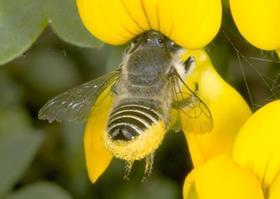
New research from Argentina's National University in Rio Negro has found that the decline in the population of wild bees and other pollinators may be of even more concern to crop yields than the loss of honeybees, the Guardian has reported.
The worldwide study, which was published in the journal Science, discovered that wild pollinators were twice as effective as honeybees at producing seeds and fruit on crops such as onions, almonds, tomatoes and strawberries.
Wild pollinators were found to visit more plants, whereas honeybees tended to carry pollen from one flower to another on the same plant.
Lucas Garibaldi, who led the study, said that it was a 'highly risky strategy' to rely on honeybees due to the vulnerability of single species to disease and environmental changes.
A second new study also published in Science revealed that over half of wild bee species disappeared during the 20th century in the US.



